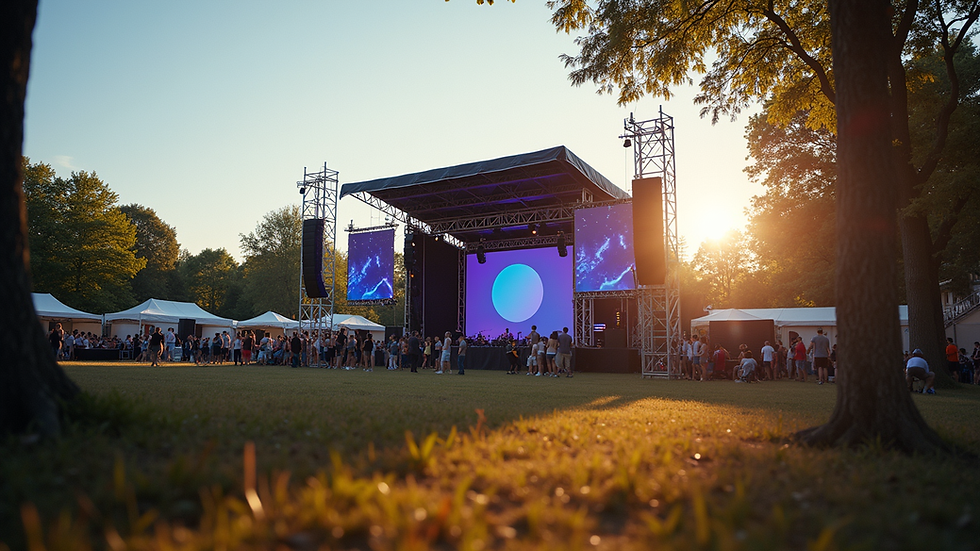Choosing the Right Audio Systems for Events
- Denzel Merritt

- Nov 4, 2025
- 4 min read
When planning an event, one of the most critical elements to consider is the audio setup. Whether it’s a block party, a corporate gathering, or a music festival, the quality of sound can make or break the experience. Choosing the right audio solutions for events ensures that every word, beat, and note reaches the audience clearly and powerfully. This guide will walk you through the essential factors to consider when selecting audio systems, helping you create an unforgettable atmosphere for your next event.
Understanding Your Event’s Audio Needs
Before diving into equipment options, it’s important to assess the specific audio requirements of your event. Different events have different sound needs based on size, venue, and type of performance.
Event Size and Audience: A small indoor meeting requires less powerful speakers than a large outdoor festival. Estimate the number of attendees to determine the necessary sound coverage.
Venue Acoustics: Indoor venues often have natural reverberation, while outdoor spaces may need more powerful systems to combat ambient noise.
Type of Event: A DJ set demands different audio equipment than a live band or a speaker presentation. Consider the type of sound sources you will have.
By clearly defining these factors, you can narrow down your choices and avoid overspending on unnecessary equipment.

Key Audio Solutions for Events
Selecting the right audio solutions for events involves choosing the right combination of speakers, microphones, mixers, and amplifiers. Here are some practical recommendations:
Speakers
Powered vs. Passive: Powered speakers have built-in amplifiers, making them easier to set up and ideal for smaller events. Passive speakers require external amplifiers but offer more flexibility for larger setups.
Speaker Placement: Position speakers to cover the entire audience area evenly. Avoid placing them too close to walls to reduce echo.
Subwoofers: For music-heavy events, subwoofers enhance bass frequencies, adding depth to the sound.
Microphones
Wired vs. Wireless: Wireless microphones provide mobility but require careful frequency management to avoid interference.
Types: Handheld mics are versatile, lavalier mics are discreet for speakers, and shotgun mics are great for capturing focused sound.
Mixers and Amplifiers
Mixers: Choose a mixer with enough channels to accommodate all audio inputs. Digital mixers offer advanced features like effects and remote control.
Amplifiers: Match amplifiers to your passive speakers’ power requirements to ensure optimal performance.
Cables and Accessories
Use high-quality cables to prevent signal loss.
Have backup batteries and power supplies ready.
How to Optimize Sound Quality
Achieving excellent sound quality is not just about equipment but also about setup and tuning. Here are some actionable tips:
Sound Check: Always perform a thorough sound check before the event starts. Test all microphones and speakers.
Equalization (EQ): Adjust EQ settings to balance frequencies and reduce feedback.
Monitor Speakers: Use stage monitors for performers to hear themselves clearly.
Volume Levels: Set volume levels to avoid distortion while ensuring audibility.
Feedback Control: Position microphones and speakers to minimize feedback loops.
By following these steps, you can ensure clear and balanced sound throughout your event.

Why Professional Event Audio Systems Matter
Investing in professional event audio systems can elevate your event’s overall experience. These systems are designed to handle the demands of live events, providing reliability and superior sound quality. Professional setups also come with technical support, which can be invaluable during complex events.
For example, the upcoming MixFest Block Party is a perfect occasion to showcase how high-quality audio solutions can enhance community gatherings. Clear sound ensures that every announcement, performance, and interaction resonates with the audience, creating a vibrant and engaging atmosphere.
Tips for Renting vs. Buying Audio Equipment
Deciding whether to rent or buy audio equipment depends on your event frequency, budget, and technical expertise.
Renting: Ideal for one-time or occasional events. Rental companies often provide setup and technical support.
Buying: Suitable for frequent events or if you have a dedicated audio team. It requires upfront investment and maintenance.
Consider your long-term needs and consult with audio professionals to make the best choice.
Preparing for Your Event Audio Setup
Preparation is key to a smooth audio experience. Here’s a checklist to help you get ready:
Confirm the venue’s power availability and requirements.
Plan the layout for speakers and cables to avoid hazards.
Schedule enough time for setup and sound checks.
Train your team or hire experienced audio technicians.
Have contingency plans for technical issues.
Proper preparation reduces stress and ensures your event runs without audio interruptions.
Enhancing Your Event with the Right Audio Solutions
Choosing the right audio solutions for events is a strategic decision that impacts the success of your gathering. By understanding your event’s needs, selecting appropriate equipment, and optimizing sound quality, you can create an immersive and enjoyable experience for all attendees.
If you’re organizing an event like the MixFest Block Party, don’t hesitate to reach out for expert advice on event audio systems. Professional guidance can help you navigate the technical aspects and deliver sound that truly connects with your audience.
Invest in quality audio solutions and watch your event come alive with vibrant, clear sound that leaves a lasting impression.






Comments